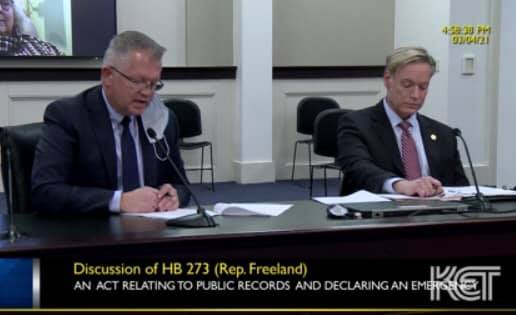
What is the gravest threat to open government in the 2021 General Assembly?
Until February 25, we would have pointed to HB 273, a bill that creates a new exception to the open records law for photographs or videos that depict the murder, death, rape or sexual assault of a person.
https://apps.legislature.ky.gov/record/21rs/hb273.html
The introduction of HB 312 changed that. In what political sage Al Cross has described as "hid[ing] your cards and play[ing] them quickly, to limit debate, political risk and public scrutiny," the House shepherded HB 312 to its swift passage, sending it to the Senate in 48 hours.
https://apps.legislature.ky.gov/record/21rs/hb312.html
The public outcry to lawmakers' stealth in securing even greater stealth all but eclipsed HB 273.
We knew there was little chance of defeating HB 273. We also knew that no one would testify against the bill. It's passage out of committee with no discussion was ensured—and reprehensible.
Most importantly, we agreed with Paducah Sun editor John Mangalonzo's February 21 editorial opposing HB 273.
https://www.paducahsun.com/opinion/you-have-to-know-what-you-re-giving-…
Mangalonzo grew up in the Philippines under the Marcos regime. Access to information—that thing we take for granted—was virtually unknown.
In an editorial entitled "You have to know what you are giving up," Mangalonzo wrote:
"So, take away a little here and a little there won't make a difference, you say?
"Until you've been in a place where all is gone, then you don't have a grasp of what you're giving up."
The "little here and little there" to which Mangalonzo referred was photographs and videos depicting a person's death, killing, sexual assault, and rape that Rep. Chris Freeland proposed to exempt from the open records law under HB 273.
And so we asked to testify against HB 273.
https://ket.org/share/legislature/archives/?nola=WGAOS+022143&stream=aH… (beginning at minute 15:50).
We have written at length about the proposed exception that, on its face, makes sense. What public purpose could disclosure of re-traumatizing photos or videos of these horrific incidents serve?
The answer lies on Minneapolis's Chicago Avenue, in a Wendy's parking lot in Atlanta, and outside Louisville's Yaya's BBQ at 26th and Broadway.
Surveillance and bystander video taken at these locations told the public a great deal about how public servants—in these instances law enforcement officers—discharged their public duties.
Our goal in testifying to the Senate Judiciary Committee was to engaged with its members. We hoped to explain that the privacy exception — which has existed in the open records law since the law was enacted in 1976 — shields from disclosure photos and videos that reveal nothing about how a public servant discharges his duties.
Disclosure in these circumstances constitutes a "clearly unwarranted invasion of personal privacy."
But photos and videos that reveal whether "public servants are indeed serving the public"—or not—are disclosable if the public interest in scrutinizing the conduct of those public servants is greater than the privacy interests.
In other words, the privacy exception strikes a balance between public and private rights.
HB 273 ignores the public's right altogether. It slams the door closed on photos and videos like those depicting the deaths of George Floyd, Rayshard Brooks, and David McAtee.
Denied access to the public records to verify the facts, we will have to accept the official narrative—not unlike life under the Marcos regime.
It's likely that Rep. Freeland, (R-Benton), and Sen. Danny Carroll, (R-Paducah) — who joined Freeland in support of HB 273 — saw Mangalonzo's February 21 editorial in The Paducah Sun.
But Mangalonzo's compelling arguments, as well as our arguments, fell on deaf ears. Only two senators, Gerald Neal and Karen Berg, both of Louisville, voted against the bill. There was little additional discussion. The Kentucky Press Association took a neutral position.
What did we learn?
We learned that HB 273 has been amended to permit access to: victims and their families or representatives; public agencies investigating official misconduct; and attorneys representing persons investigated for or charged with a crime related to the incident.
We did we not learn?
We did not learn to what agency(ies) the exception applies. Is it the courts only, as Freeland has stated on multiple occasions in the past?
The lawmakers seemed to draw a blank in trying to respond to this most basic of questions.
As for testifying before a legislative committee? To quote Emily Bronte, it is "a source of little visible delight, but necessary."
And the answer to the question: what is the gravest threat to open government in the 2021 General Assembly?
It is lawmakers' unwillingness to engage in meaningful debate and open their minds to the possibility that they might be wrong.
"So we beat on, boats against the current." We'll be back on Wednesday at noon to testify against HB 312.
Why? Because the other grave threat to open government in this session is silence.


